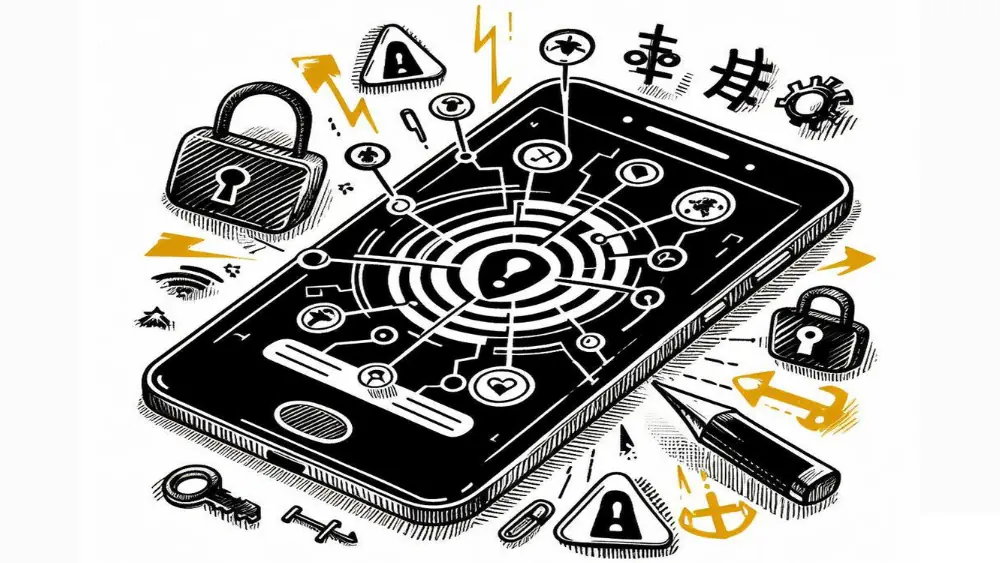 illustration: bing.com/create
illustration: bing.com/createAccording to the "Cybersecurity of Endpoint Devices Post-2022" report by Digital Poland, attacks on the public sector infrastructure increased by 500%, and 58% of organizations reported security breaches. Attacks, fraud, and scams - often aided by artificial intelligence - are expected to rise in 2024. Mobile users, particularly those using Android, which holds 72% of the market, are especially vulnerable.
Most Common Cyber Threats
The most common cyber threats to mobile devices include:
- Phishing and Pharming: pretending to be a trusted source to obtain confidential information.
- Malware: malicious software, viruses, and Trojans that enable unauthorized access to devices.
- Ransomware: software that locks access to systems and demands a ransom for unlocking.
- Man-in-the-Middle: intercepting and modifying network traffic in unsecured Wi-Fi networks.
- Juice Jacking: data theft from smartphones via fake chargers in public places.
"In the context of mobile devices for business, it’s essential to alert employees to follow basic security principles. First, only download apps from reputable stores - Google Play for Android. Second, avoid suspicious links, even from known contacts. Third, verify sender email addresses carefully," advises Monika Czech, KNOX Focus Sales Specialist at KOMSA Poland. "Cybercriminals can be very creative. For example, a phishing email may come from a domain ending in .corn instead of .com - easy to miss on first glance. Fourth, use password managers and create strong, unique passwords for each service. In Poland, the most popular password is still `123456.` Lastly, enable two-factor authentication. This is a good place to start individually."
Hardware and Software Protections
In addition to best practices, companies should use both hardware and software solutions to secure mobile devices. Reputable manufacturers offer built-in security measures at the chipset level, which protect against unauthorized OS rollbacks and encrypt sensitive data.
Additionally, specialized software for IT administrators (Mobile Device Management) allows management of device fleets, detection of tampering attempts, and other security measures.
"While a private user may benefit from good practices and antivirus software, businesses should also consider systemic solutions. Training staff alone is insufficient. After all, an organization`s reputation and potential financial losses are at stake," says Monika Czech of KOMSA Poland. "Comprehensive protection options are available on the Polish market, such as Samsung Knox, which offers both hardware and software security. The effectiveness of this security platform is underscored by the fact that Poland`s Internal Security Agency (ABW) has certified it for cryptographic protection, covering selected security mechanisms."
Mobile device cyber threats pose an increasing challenge for businesses. With attacks expected to rise in 2024, it is crucial to implement appropriate protections at both user and organizational levels.
Source: Newseria Lifestyle
COMMERCIAL BREAK
New articles in section Law in media
Dietary supplement ads in Poland. Who keeps influencers in check?
Newseria, KFi
One in three Polish internet users considers influencer recommendations when deciding on medicines and dietary supplements. Although promotion of such products is regulated, there are still cases of advertising that skirt the law.
SEO Poisoning. Hackers Use Search Engines to Target Businesses
Piotr Rozmiarek
Search engines help us quickly find information, but they can also be used by cybercriminals. SEO poisoning is a tactic where attackers manipulate search engine rankings to place harmful websites at the top of search results.
Phishing in the Cryptocurrency Industry. Fake Recruitments Steal Data
Piotr Rozmiarek
Security researchers have detected a social engineering campaign targeting job seekers in the Web3 industry. The attack aims to conduct fake job interviews via a meeting application that installs information-stealing malware.
See articles on a similar topic:
Cyber Attack on a Corporate Smartphone. How to Protect Yourself
KrzysztoF
Internet-connected mobile devices are an attractive target for cybercriminals. The key to protecting sensitive business data is employee awareness, hardware solutions, and appropriate software. This mini-guide provides a quick overview of how to protect each of these areas.
What Data Google Collects. Privacy on the Internet
KF
According to a gs.statcounter.com report – May 2018, Google captures over 97% of internet users. Currently, many free applications are available to users. What does Google collect? When using the most popular search engine, we should be aware of how our data is collected and used.
Cyberwarfare on the Internet. The ESET Report
KF
Governments, corporations, and even the education sector are becoming targets of advanced cyber attacks. The report for the period from October 2023 to March 2024, prepared by ESET, sheds light on the intensification of activities by Advanced Persistent Threat (APT) groups, which conduct espionage, sabotage, and destabilization operations in key sectors on behalf of states.
Hate in the Polish Internet. IRCenter Study
Krzysztof Fiedorek
The proportion of hate speech victims is inversely proportional to the age of internet users. The study authors point out that this is directly influenced by the fact that older generations are instilled with the principles of respectful discussion and use the internet less frequently.





























